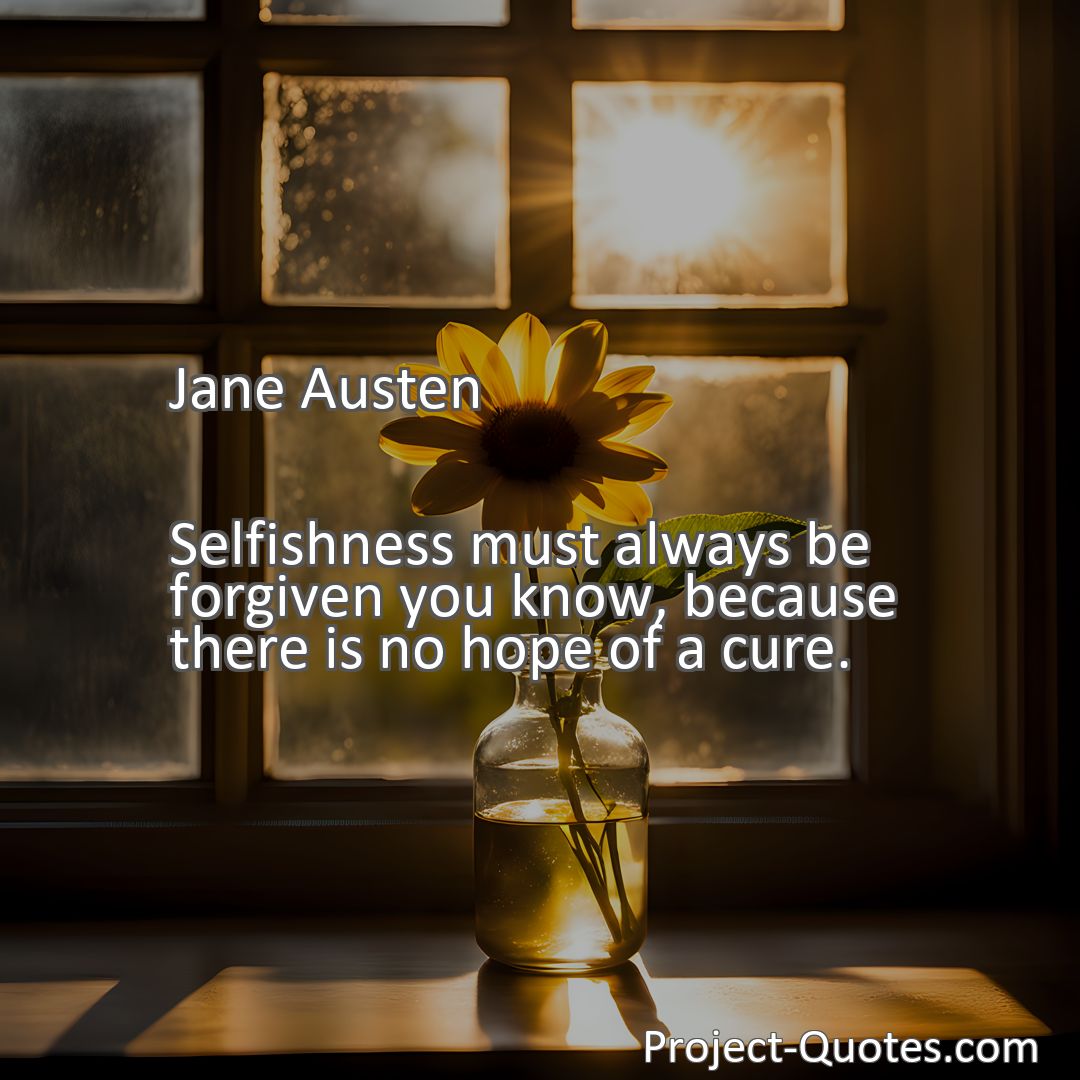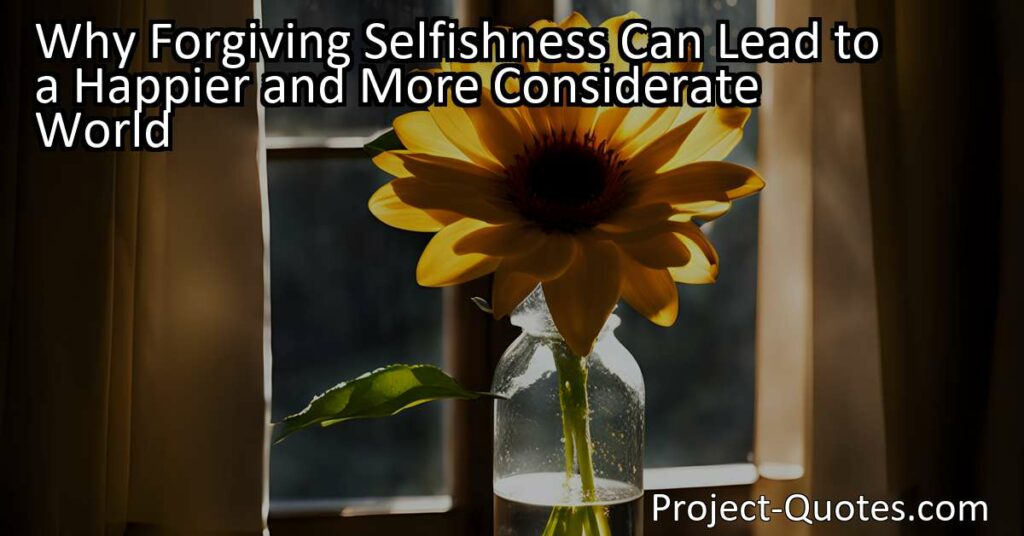Selfishness must always be forgiven you know, because there is no hope of a cure.
Jane Austen
Why Forgiving Selfishness Can Lead to a Happier and More Considerate WorldImagine a world where instead of getting upset when someone acts selfishly, we take a deep breath and try to understand their perspective. Jane Austen’s idea of forgiving selfishness teaches us that accepting our flaws while striving to be the best version of ourselves can create a more patient, kind, and harmonious society. So, let’s mix in some patience, understanding, and forgiveness to bake a happier and more considerate community every day.
Table of Contents
Meaning of Quote – Selfishness must always be forgiven you know, because there is no hope of a cure.
Selfishness is a bit like a sneaky gremlin that lives inside all of us. It often pops up when we least expect it, whispering in our ear that we should think of ourselves before anyone else. We’ve all been there at some point, right? We’ve all wanted to keep the biggest slice of cake for ourselves or to have the first turn at a new video game. It’s part of being human to think about our own needs and wants. But here’s the thing: the wonderful Jane Austen once said, “Selfishness must always be forgiven you know because there is no hope of a cure.”
Now that’s a bold statement, isn’t it? It makes you wonder if selfishness is really such a terrible thing if it might be something we should learn to accept rather than try to change. But hold your horses! Before we go any further, let’s unpack what Jane Austen might have meant by that.
Selfishness is often seen in a negative light. It’s like the school bully of traits no one really wants to be called selfish. But Austen suggests that maybe we should be more understanding and forgiving when we come across a bit of self-centered behavior. Because the truth is, we all can be a bit selfish at times, and expecting someone to be completely free from it might be asking too much.
So why should we forgive selfishness? Well, to start with, lets think about why we’re all a bit selfish sometimes. Imagine you’re planning on sharing your lunch with a friend, but you’re really, really hungry. If you decide to eat it all yourself, that’s being a little selfish, right? But it’s also because you’re listening to your body telling you that you need food. It’s kind of a survival thing. So, in a way, a dash of selfishness can actually be quite important.
Now, this doesn’t mean it’s okay to always put ourselves first and ignore others. Not at all! What Jane Austen’s words suggest is that when people are selfish, we should try to understand why they’re acting that way and not hold it against them forever. After all, nobody’s perfect!
Imagine if we all got really upset every time someone acted selfishly. We’d be in a world of constant arguments and apologies! But if we take a deep breath and try to understand where they’re coming from, we could instead have a world full of patience and kindness. Sounds nicer, doesn’t it?
Forgiving selfishness also doesn’t mean letting it run wild like a dog off its leash in a park. Nope, we still need to help each other learn how to share, take turns, and think about the feelings of those around us. That’s part of being a good friend, family member, and well, a good human being.
Now lets think about this ‘no hope of a cure’ bit. When Austen says there’s no cure for selfishness, it might sound a bit like giving up, like there’s nothing we can do about it. But rather than throwing in the towel, perhaps what she means is that we need to accept that we all have flaws, selfishness being one of them, and work on being the best versions of ourselves despite them.
It’s like when you’re playing a team sport. Everyone has to work together, pass the ball, cheer each other on, and sometimes someone else scores the goal instead of you. Sure, you might feel a little tug of selfishness wishing you were the one scoring, but you also feel pride in your team and happiness for your teammate. That’s you, overcoming selfishness and being a team player!
The same goes for other parts of life too. If you see someone who needs help with their homework and you’re good at that subject, you can choose to lend a hand rather than focusing on something else you’d rather be doing. That’s taking a step away from selfishness and toward being a kind and helpful person.
Austen’s thoughts on forgiving selfishness also teach us a lot about empathy. That means putting ourselves in someone else’s shoes and trying to understand why they feel the way they do. Maybe your friend snapped at you because they were having a bad day. Instead of snapping back because you feel hurt, which is a form of being selfish with your emotions, try to understand their situation and forgive them. You never know when you might need that same understanding from someone else.
What we can really take from Jane Austen’s words is that being a little selfish is a part of life, but it doesn’t have to define us. We can acknowledge our selfish moments, learn from them, and forgive ourselves and others when they happen. Doing this helps us grow as individuals and makes the world a friendlier place.
Her idea isn’t a free pass to always put ourselves first, but a gentle reminder to forgive the little selfish moments that crop up in ourselves and those around us. And by doing so, we’re not curing selfishness, but we ARE learning to balance our own needs with the needs of others, creating a more harmonious world for us all to share.
In a way, Jane Austen is giving us the secret ingredient to a better society: a pinch of patience, a spoonful of understanding, and a heaping cup of forgiveness. Mix it all together, and you’ve got yourself a recipe for a happier, more considerate community. Now that’s something worth baking into every day of our lives!
I hope this quote inspired image brings you hope and peace. Share it with someone who needs it today!


